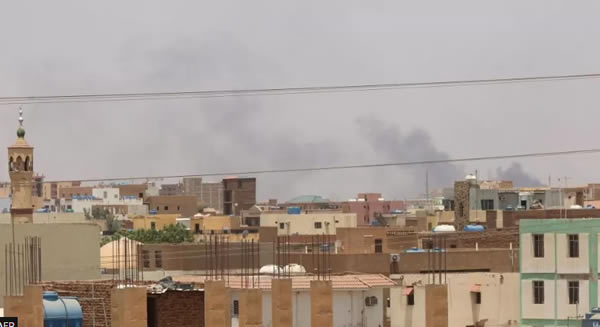
The United States issued economic and travel sanctions Thursday on combatants violating cease-fire agreements in Sudan, imposing restrictions on visas and cutting off financial sources for both the Sudanese armed forces and the paramilitary Rapid Support Forces.
In a statement, White House national security adviser Jake Sullivan said that despite the cease-fire agreement that’s in place, “senseless violence has continued across the country — hindering the delivery of humanitarian assistance and hurting those who need it most.”
The fighting, which has killed more than 850 and injured thousands, began in mid-April. The U.S. and Saudi Arabia brokered a seven-day truce that was signed May 20 and was designed to allow for the delivery of humanitarian assistance. The combatants have blamed each other for violations of the agreement. They agreed to a five-day extension May 29.
Laying blame on both sides, the White House and Treasury Department on Thursday announced sanctions on businesses linked to the leaders of both forces — armed forces chief General Abdel Fattah al-Burhan and paramilitary leader General Mohamed Hamdan Dagalo. The two are former allies who, together, mounted an October 2021 military coup.
Each man is closely linked to two of the four firms specifically targeted by the new sanctions.
“In the first instance, we need to hold people accountable for the violence and the destruction of Sudan,” said a senior administration official, who, as is customary when briefing reporters, was not identified by name. “Two, we’re focused on behavior change. The two parties have not abided by the various cease-fires that they have signed; they have not adhered to the principles of international humanitarian law. And so, by focusing on the way in which they conduct this war, how they access funds, how they access weapons, it is our goal to change their calculus and to create a scenario in which the guns will finally be silenced.”
The official did not name individuals targeted by visa restrictions, citing State Department policy.
Speaking to reporters earlier in the day from Oslo, Norway, before the sanctions were formally announced, U.S. Secretary of State Antony Blinken said clear violations were observed on both sides in the conflict, and he warned that the U.S. was considering the actions.
Blinken said the U.S. would continue to be engaged and work toward a solution to the conflict. Earlier in the day, a State Department spokesman said the United States was ready to facilitate discussions between the warring sides if they showed a commitment to abiding by a cease-fire.
Meanwhile, the U.N. Security Council met Wednesday in a 90-minute, closed-door session at the request of Secretary-General Antonio Guterres. It was only the fifth time in his more than five-year tenure that he had requested such a meeting.
“We are facing a dramatic situation in Sudan, both on the political and the humanitarian end, and the secretary-general wanted to share some thoughts that he has with council members,” his spokesman, Stephane Dujarric, told reporters.
“Despite these challenges, we continue to deliver humanitarian supplies to communities in need,” Dujarric said. “The Office for the Coordination of Humanitarian Affairs says that more than two dozen trucks carrying assistance were on the move over the past two days to different locations in the country.”
The armed leaders’ 2021 putsch derailed the transition of Africa’s third-largest country to civilian rule, after the 2019 ouster of longtime leader Omar al-Bashir. Tensions between the two had been growing over disagreements about how the paramilitary forces should be integrated into the army and who should oversee that process. The restructuring of the military was part of an effort to restore the country to civilian rule and end the political crisis sparked by the 2021 coup.
VOA’s Anita Powell and Margaret Besheer contributed to this report.
Source: voanews.com























